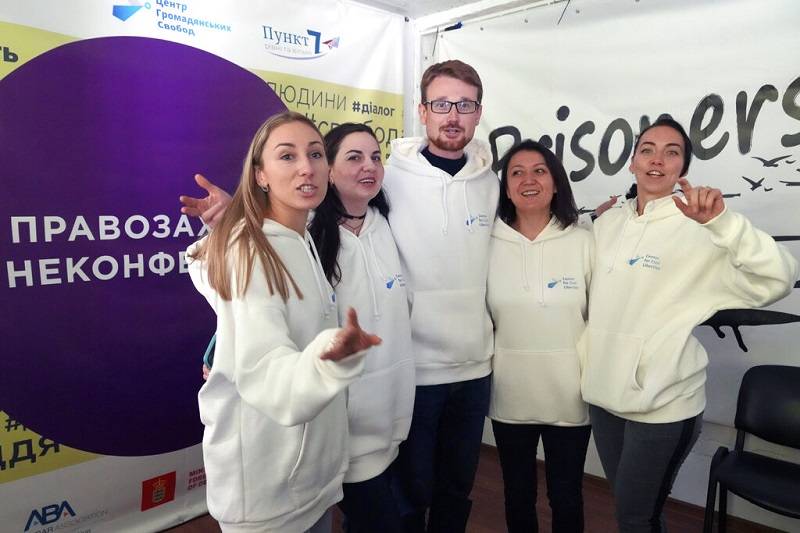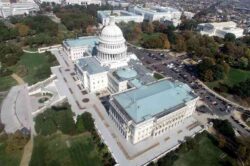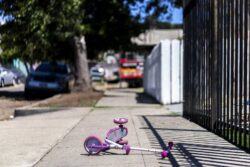Europe praises, Belarus scorns Nobel for rights defenders

Managers of the Center for Civil Liberties react in Kyiv, Ukraine, Friday, Oct. 7, 2022.
15:49 JST, October 8, 2022
BERLIN (AP) — Officials in Europe and the U.S. praised the awarding of this year’s Nobel Peace Prize to activists standing up for human rights and democracy in Russia, Belarus and Ukraine while authorities in Belarus scorned the move.
Russia’s invasion of Ukraine this year has pushed Moscow’s relationship with its Western neighbors to a new low. Even before that, ties had been fraught over President Vladimir Putin’s backing for pro-Russian separatists in Ukraine, his support for authoritarian Belarusian President Alexander Lukashenko and Syrian leader Bashar Assad, and his repression of political opponents, such as dissident Alexei Navalny at home.
“I hope the Russian authorities read the justification for the peace prize and take it to heart,” Norwegian Prime Minister Jonas Gahr Støre said after the Nobel Committee awarded the 2022 prize to imprisoned Belarus rights activist Ales Bialiatski, the Russian rights group Memorial and the Ukrainian Center for Civil Liberties, which is focusing on documenting war crimes.
“It sends a signal that keeping civil society down is protecting one’s own power. It is seen from the outside and it is criticized,” he said.
French President Emmanuel Macron was among the world leaders who quickly hailed the laureates, tweeting that their prize ”pays homage to unwavering defenders of human rights in Europe.”
“Artisans of peace, they know they can count on France’s support,” the French leader said.
U.S. President Joe Biden said the winners “remind us that, even in dark days of war, in the face of intimidation and oppression, the common human desire for rights and dignity cannot be extinguished.”
“The brave souls who do this work have pursued the truth and documented for the world the political repression of their fellow citizens — speaking out, standing up, and staying the course while being threatened by those who seek their silence,” Biden said in a statement.
NATO chief Jens Stoltenberg congratulated the winners, tweeting that “the right to speak truth to power is fundamental to free and open societies.”
Danish Foreign Minister Jeppe Kofod said the award needs to be seen against the backdrop of the war in Ukraine.
“There is war in Europe. Your work for peace and human rights is therefore more important than ever before,” he said to the winners. “Thank you for that.”
German Chancellor Olaf Scholz said the three groups “fully deserved” the awards.
“The bravery, passion and clarity with which (they) are fighting for freedom and justice deserves the highest respect,” he told reporters on the sidelines of a meeting of European Union leaders in Prague.
In Paris, exiled Belarus opposition leader Sviatlana Tsikhanouskaya told The Associated Press that the award was “recognition of all the people who are sacrificing their freedom and lives for the sake of (Belarus).”
Over the last two years, the government of Belarus has waged a violent crackdown on journalists and protesters who say that the 2020 presidential election was rigged, beating thousands, detaining tens of thousands and charging rights defenders with cases that the opposition calls politically motivated. Many have fled the country for their own safety.
“Physically, you know, this prize will not influence their situation but I am sure it (will) influence the moods and intentions of other countries to help those people who are behind bars,” Tsikhanouskaya said.
Svetlana Alexievich, a Belarusian journalist and writer who won the 2015 Nobel Prize in literature, called Bialiatski “a legendary figure.”
“What Viasna, founded by him, has done and is doing in the current circumstances, is in his spirit, in his philosophy,” Alexievich told reporters Friday.
She added that Bialiatski is “seriously ill” and needs medical treatment, but is “unlikely to be freed from behind bars.”
Belarus’ Foreign Ministry, meanwhile, denounced the Nobel committee’s decision to award the prize to Bialiatski as “politicized.”
Ministry spokesman Anatoly Glaz said “in recent years, a number of important decisions — and we’re talking about the peace prize — of the Nobel committee have been so politicized, that, I’m sorry, Alfred Nobel got tired of turning in his grave.”
Olav Njølstad, director of the Norwegian Nobel Institute, dismissed the criticism.
“I’m quite sure we understand Alfred Nobel’s will and intentions better than the dictatorship in Minsk,” he said.
Meanwhile, a senior adviser to Ukrainian President Volodymyr Zelenskyy also took issue with the award, saying the Nobel Committee “has an interesting understanding of (the) word ‘peace’ if representatives of two countries that attacked a third one receive (the prize) together.”
“Neither Russian nor Belarusian organizations were able to organize resistance to the war,” Mykhailo Podolyak tweeted. “This year’s Nobel is ‘awesome.'”
But Oleksandra Matviichuk, a Ukrainian lawyer who heads the Center for Civil Liberties, said the award was for the groups, not the countries they were based in. In an interview with German weekly Der Spiegel, she said her co-laureates had spoken out clearly against Russia’s hostility toward Ukraine since 2014.
“They always called things by their name,” she said. “That’s why Ales Bialiatski is in prison now and Memorial is banned.”
“It’s not about the countries, but about the people who are jointly standing up to evil,” she said.







